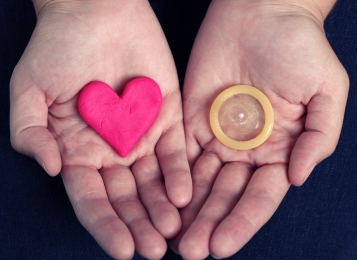16 March 2016
 Young people have spoken. In an era where information about sex and sexuality is pervasive on the internet, they say sexuality education classes at school need to be about much more than just sex.
Young people have spoken. In an era where information about sex and sexuality is pervasive on the internet, they say sexuality education classes at school need to be about much more than just sex.
A report released this week by the University of South Australia summarising the views of more than 2000 students, aged between 13 and 16 years from 31 high schools in South Australia and Victoria, found that while students counted on sex education classes in schools as an important source of information, they wanted more from the classes than just a biology lesson.
The report, It’s not all about sex: Young people’s views about sexuality and relationship education, showed that for both boys and girls, school sexuality and relationship classes were their number one source of information and also one of the most trusted sources.
Lead researcher for the study, UniSA’s Emeritus Professor Bruce Johnson says that 77% of girls and 74% of boys cited school sex education programs as their number one source of information about sexuality and relationships, with friends coming in as their second most likely source.
“I think this is evidence of some really good work taking place in SA to support teachers both in the development of materials and in providing professional education for teachers,” Prof Johnson says.
“The study was also designed to see how we might improve what we are doing and it has delivered some interesting results.
“Students were interested in more than the biology of sex or the usual run down on safe sex practices; they wanted to know about love, starting a relationship, gender diversity, breaking up, violence in relationships, sexual pleasure and a range of other topics.
“Research done previously shows that because adults usually decided what was taught in sexuality and relationships education classes and were also the people evaluating how these programs were received, we are at risk of actually not addressing some of the issues of most concern to students.
“There will always be some sensitivity around how these subjects are taught, but having input from high school students is vital if we are to be able to reach them with the information that matters the most to them as they grow up.”
- Overall, the survey found that 77% of girls and 74% of boys cited school sex education programs as their number one source of information about sexuality and relationships, with friends coming in as their second most likely source.
- For girls, mothers were their most trusted source of information about sexuality and relationships at 67% of students, but school programs came a close second at 64% and 68% of boys putting school programs at the top as their most trusted source of information.
Asked what they wanted to learn more about, the gender divide became more stereotyped.
- Girls wanted to learn more about gender diversity (52%), violence in relationships (54%) staying safe online and ending a relationship, while boys wanted more information on how to have sex (38%), sexual pleasure (38%), different sexual acts, masturbation and pornography.
- However, both boys and girls said they wanted to know more about love and starting a relationship.
- More girls than boys said they felt embarrassed learning about sexuality and relationships in mixed gender classes.
- 51% of the Victorian students surveyed reported that they felt embarrassed, uncomfortable or annoyed during sexuality and relationship classes, whereas in SA only 40% reported the same.
- 81% of SA students said they had been taught about respect in relationships but only 75% of Victorian students reported the same.
The research has been undertaken as part of the Engaging Young People in Sexuality Education Research Project funded by the Australian Research Council and supported by the Departments of Education (DECD and DEECD) in South Australia and Victoria.
Its aim is to contribute to the future development of relevant and authentic sexuality education resources for the National Curriculum in Health and Physical Education.
The research is being conducted by a cross-institutional team involving experienced researchers and professionals from the field of education in sexuality, health and relationships including Emeritus Professor Bruce Johnson (UniSA), Associate Professor Lyn Harrison, Dr Debbie Ollis, Dr Leanne Coll (Deakin University), Dr Helen Calabretto, Jane Flentje (SHine SA), Professor Colleen McLaughlin (University of Sussex), Dr Peter Arnold and Dr Clare Bartholomaeus (UniSA).
More information about the research is available at www.youthsexuality.com.au
Media contact: Michèle Nardelli office +61 883020966 mob 0418823673 email michele.nardelli@unisa.edu.au


